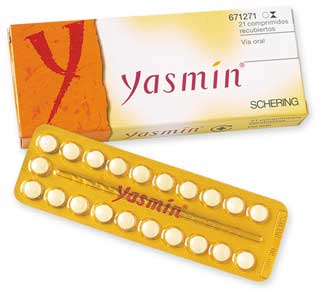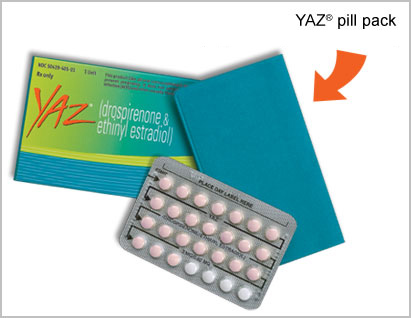

On September 26, 2011, FDA informed the public that it has not yet reached a conclusion, but remains concerned, about the potential increased risk of blood clots with the use of drospirenone-containing birth control pills. FDA has completed its review of the two 2011 studies that looked at the risk of blood clots for women who use drospirenone-containing birth control pills, previously mentioned in FDA's Drug Safety Communication issued on May 31, 2011 .1,2 FDA is continuing its review of a separate FDA-funded study that evaluated the risk of blood clots in users of several different hormonal birth control products (contraceptives). Preliminary results of the FDA-funded study suggest an approximately 1.5-fold increase in the risk of blood clots for women who use drospirenone-containing birth control pills compared to users of other hormonal contraceptives.
FDA has scheduled a joint meeting of the Reproductive Health Drugs Advisory Committee and the Drug Safety and Risk Management Advisory Committee on December 8, 2011 to discuss the risks and benefits and specifically the risk of blood clots of drospirenone-containing birth control pills.
The following questions and answers provide an overview of this potential safety issue.
Q2. Which birth control pills (oral contraceptives) contain drospirenone?
Q3. What is a venous thromboembolic event (VTE)?
Q7. What should women do if they are currently taking birth control pills containing drospirenone?
Q9. Has FDA communicated to the public about this issue before?
1. What is drospirenone?
A. Mostbirth control pills (combination oral contraceptives) combine a synthetic version of the female hormone progesterone (referred to as a progestin) with a synthetic version of the female hormone estrogen. Drospirenone is one of several different progestins that are used in birth control pills.
2. Which birth control pills (oral contraceptives) contain drospirenone?
哪些避孕藥裡面含有 drospirenone
Birth control pills containing drospirenone include YAZ (generics – Gianvi and Loryna), Yasmin (generics – Ocella, Syeda, and Zarah), Beyaz, and Safyral. Some birth control pills containing drospirenone are also approved to treat symptoms of premenstrual dysphoric disorder (PMDD), to treat moderate acne, and to raise folate levels in women who choose to use an oral contraceptive for contraception.
The available epidemiologic studies have only examined the risk of venous thromboembolism (VTE) in users of contraceptive pills that contain 3 mg of drospirenone and 0.03 mg of ethinyl estradiol (an estrogen), and not other pills that contain 3 mg of drospirenone combined with a lower dose of estrogen (e.g., 0.02 mg ethinyl estradiol).1-6 At this time, it is unknown if the reported risk applies to all drospirenone-containing products.
3. What is a venous thromboembolic event (VTE)?
什麼是靜脈血栓栓塞症
A. A deep vein thrombosis (DVT)深層靜脈栓塞 is a rare but serious condition where a blood clot forms inside a vein. These blood clots usually form in the lower leg or thigh, but can break loose and travel to other areas of the body such as the lungs. If the clot travels to the lung, it is called a pulmonary embolism (PE), a potentially fatal condition where an artery in the lung becomes blocked. DVTs and PEs are also called venous thromboembolic events, or VTEs.
The symptoms of a DVT include the new onset of persistent leg pain, while those of a PE include severe chest pain, and sudden shortness of breath. Women experiencing these symptoms should contact a healthcare professional immediately because VTEs can be life-threatening.
4. What is already known about combination birth control pills and the risk of venous thromboembolism (VTE)?
哪些是我們已經知道靜脈血栓栓塞和避孕藥的關聯?
A. VTE is already known to be a rare but serious possible side effect of taking any birth control pill containing a progestin and estrogen. The risk of VTE in users of birth control pills is low, although it is higher than the risk of VTE in women who do not take birth control pills. The risk of VTE in pregnant and postpartum women (about 20 to 30 cases per 10,000 women) is even higher than that in women who take birth control pills.7
The drug labels for all combination birth control pills include warning information on the potential risk of VTE and describe additional known factors that increase this risk. The risk of VTE associated with birth control pills increases as a woman gets older and is also higher in women who smoke, are overweight (obese), and have a family history of blood clots. Usually the risk of VTE is highest during the first year after starting to use a combination birth control pill and when a woman resumes use of birth control pills after a break of four weeks or longer.
5. How is FDA responding to new studies regarding the risk of venous thromboembolism (VTE) in women using birth control pills containing drospirenone?
A. FDA has completed its review of the two 2011 studies that looked at the risk of blood clots for women who use drospirenone-containing birth control pills, previously mentioned in FDA's Drug Safety Communication issued on May 31, 2011.1,2
FDA is continuing its review of an FDA-funded epidemiologic study that evaluated the risk of blood clots in users of several different hormonal products (contraceptives). Preliminary results of the FDA study suggest an approximately 1.5-fold increase in the risk of blood clots for women who use drospirenone-containing birth control pills compared to users of other hormonal contraceptives. To put this risk into perspective, if the risk of developing a blood clot among women using other hormonal contraceptives is about 6 women in 10 thousand, then the risk of developing a blood clot among women using drospirenone-containing oral contraceptives would be about 10 women in 10 thousand.
Given the conflicting nature of the findings from the six published epidemiologic studies evaluating this risk, as well as the preliminary data from the FDA-funded study (See Data Summary), FDA has scheduled a joint meeting of the Reproductive Health Drugs Advisory Committee and the Drug Safety and Risk Management Advisory Committee on December 8, 2011 to discuss the risks and benefits, and specifically the risk of blood clots, of drospirenone-containing birth control pills.1-6 The full study report of the FDA-funded study, along with the completed FDA review of the results of the study, will be presented and discussed at the Advisory Committee meeting in December 2011.
6. What should healthcare professionals do when considering the use of birth control pills containing drospirenone?
A. Healthcare professionals are advised to consider the risks and benefits of drospirenone-containing combination oral contraceptives for a specific patient in light of her risk for developing blood clots before prescribing a drospirenone-containing oral contraceptive. Known risk factors that increase the risk of a blood clot include smoking, being overweight (obesity), and family history of blood clots, in addition to other factors that contraindicate use of birth control pills.
Healthcare professionals should counsel their patients about the known information regarding the risk of VTE with drospirenone-containing oral contraceptives compared to levonorgestrel-containing oral contraceptives. Women currently taking a drospirenone-containing birth control pill should be informed of the potential risk.
7. What should women do if they are currently taking birth control pills containing drospirenone?
已經在服用含有drospirenone的婦女應該怎麼做?
A. Women who are already taking birth control pills containing drospirenone should continue taking their pills as directed unless told otherwise by their healthcare professional.
Women who are not currently taking a drospirenone-containing birth control pill should talk to their healthcare professional before deciding if a birth control pill that contains drospirenone is right for them.
The risks and benefits of drospirenone-containing birth control pill for a specific patient should be considered in light of her risk for developing blood clots.
Women should know how to recognize the symptoms of VTE and should contact their healthcare professional immediately if they experience persistent leg pain, severe chest pain, or sudden shortness of breath. Women should also discuss any questions or concerns about their use of birth control pills with their healthcare professional and report any side effects to the FDA MedWatch program using the "Contact Us' information at the bottom of the page.
8. Are there women who should not take birth control pills, particularly those containing drospirenone?
有哪些女性應該避免服用含有drospirenone的避孕藥呢?
A. Women with certain conditions or risk factors should not use any combination birth control pill. FDA recommends that women who are over age 35 and smoke should not take any type of combination birth control pill (including those containing drospirenone), due to an increased risk of serious cardiovascular events. The risk of VTE also increases with age and is higher in women who smoke, are overweight (obese), or have a family history of blood clots. Women with a history of blood clots, heart attack, or stroke should not take combination birth control pills. Additionally, women who are pregnant or think they may be pregnant should not use combination birth control pills.
Healthcare professionals should consider the risks and benefits of drospirenone-containing combination oral contraceptives for a specific patient in light of her risk of developing a VTE before prescribing a drospirenone-containing oral contraceptive. Healthcare professionals should also counsel their patients about the known information regarding the risk of VTE with drospirenone-containing oral contraceptives compared to levonorgestrel-containing oral contraceptives.
Because drospirenone, in contrast to other progestins used in combination oral contraceptives, has the potential to increase serum potassium levels, women with kidney (renal) or adrenal disease should not use birth control pills containing drospirenone.
For additional labeling information on all combination birth control pills, visit Drugs@FDA athttp://www.accessdata.fda.gov/scripts/cder/drugsatfda/index.cfm.
9. Has FDA communicated to the public about this issue before?
A. On May 31, 2011, the U.S. Food and Drug Administration (FDA) informed the public about new information that was being assessed as part of FDA's ongoing safety review of birth control pills containing the progestin hormone drospirenone. FDA has also communicated previously about a potentially greater risk of VTE with drospirenone-containing birth control products in an April 2010 MedWatch alert.
For more information, see:
- MedWatch Alert: April 2010
- Drug Safety Communication about FDA's ongoing safety review of birth control pills containing the progestin hormone drospirenone, May 31, 2011
References
- Parkin L, Sharples K, Hernandez RK, Jick SS. Risk of venous thromboembolism in users of oral contraceptives containing drospirenone or levonorgestrel: nested case-control study based on UK General Practice Research Database. BMJ 2011; 342:d2139.
- Jick SS, Hernandez RK. Risk of non-fatal venous thromboembolism in women using oral contraceptives containing drospirenone compared with women using oral contraceptives containing levonorgestrel: case-control study using United States claims data. BMJ 2011; 342:d2151.
- Lidegaard Ø, Løkkegaard E, Svendsen AL, Agger C. Hormonal contraception and risk of venous thromboembolism: national follow-up study. BMJ 2009; 339:b2890.
- Van Hylckama V, Helmerhorst FM, Vandenbroucke JP, Doggen CJM, Rosendaal FR. The venous thrombotic risk of oral contraceptives, effects of oestrogen dose and progestogen type: results of the MEGA case-control study. BMJ 2009; 339:b2921.
- Seeger JD, Loughlin J, Eng PM, Clifford CR, Cutone J, Walker AM. Risk of thromboembolism in women taking ethinylestradiol/drospirenone and other oral contraceptives. Obstet Gynecol 2007; 110(3):587-93.
- Dinger JC, Heinemann LA, Kühl-Habich D. The safety of a drospirenone-containing oral contraceptive: final results from the European Active Surveillance Study on oral contraceptives based on 142,475 women-years of observation. Contraception 2007; 75:344-54.
- Heit JA, Kobbervig CE, James AH, et al. Trends in the incidence of venous thromboembolism during pregnancy or postpartum: a 30-year population-based study. Ann Intern Med. 2005;143:697–706.





 留言列表
留言列表
 線上藥物查詢
線上藥物查詢 